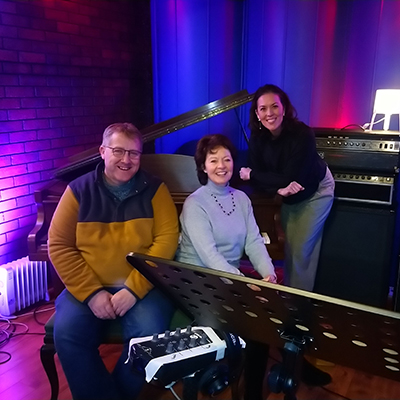A special Burns Night programme, The Secret Bard airs on BBC Radio Ulster

Date Posted: January 24, 2023
In The Secret Bard, a special Burns Night programme, Helen Mark unravels the story of Carolina Oliphant, later known as Lady Nairne. It celebrates her music with specially recorded performances of some of her songs by local singer, Sylvia Burnside, accompanied by pianist, Jonathan Rea. Produced by Yamal with support from Northern Ireland Screen’s Ulster-Scots Broadcast Fund, the programme airs on Wednesday 25th January at 6pm on BBC Radio Ulster.
For well over a century, songs like ‘Charlie is my darlin’ and ‘Will ye no come back again’ have been sung at Ulster-Scots get togethers across Northern Ireland. ‘A Hundred Pipers’ is a favourite tune for the fife and Lambeg drum and ‘The Rowan Tree’ is often the first melody taught in bagpipe classes. They were part of the music and culture which crossed the Irish Sea from Scotland in the 19th century and resonated strongly with the Ulster-Scots community here.
It is commonly believed that many of these were written by the great bard himself, Robert Burns and set to traditional folk airs. But they were in fact written by a woman, a contemporary of Burns, from a very different background, who chose to keep her identity a secret throughout her life, despite the popularity of her work.
Helen goes to Edinburgh’s Royal Mile in search of answers from Lady Carolina’s descendant, Scottish musician, Freeland Barbour, her great, great, great, great nephew.
He’s written a biography, The White Rose of Gask, an affectionate portrait of a woman born into an aristocratic Jacobite family from Perthshire. The family were ardent supporters of Bonnie Prince Charlie and had their estate confiscated for 17 years after the failure of the 1745 Jacobite rebellion.
Carolina was named in honour of the Bonnie Prince and remained a staunch supporter all her life. Many of her songs express the hope and sadness of the Jacobite cause. Matthew Warwick, education officer of the Ulster-Scots Community Network, says it is ironic that the Unionist community here have adopted and enjoy songs of Jacobite rebellion without thinking too much about their meaning.
Looking through old family records and diaries Freeland notes that Carolina is described as having a lively, attractive personality and a great sense of humour. He believes it was her sense of impishness combined with Christian modesty, which inspired her to keep her song writing activities secret from all but her sisters and closest friends.
It was a song about a Ploughman which encouraged Carolina to turn her hand to writing lyrics. She came across a version of a song, ‘The Pleughman’ at a country fair. According to Anne Lorne Gillies, one of Scotland’s best known performers and singers and a huge admirer, Carolina ‘picked up a book and was shocked to read words which she considered very rude’. She decided on an alternative – in other words, said Anne – ‘she cleaned it up’.
Carolina’s version, sung by her brother, was an instant hit across the county and she went on to write and ‘clean up’ numerous songs, all the while keeping her work a secret.
She married her second cousin, Major William Nairne, becoming a Baroness, and moved to Edinburgh where her husband was stationed at the Castle. She became part of polite Edinburgh society, while at the same time working secretly on songs which were published, with the help of friends, in the Scottish Minstrel and other song books. Her subject widened to encompass a love of nature and social commentary.
The song books introduced her work to the Ulster-Scots community through the many family and cultural connections across the “Narrow Sea” but her identity was only disclosed after her death, when her friends believed she should be recognised for her work. Even her husband had been kept in the dark.
The publication of her work revealed her to be the author of one of the most powerful, poignant songs in the Scottish folk tradition – ‘Land o’ the Leal’ – written as a comfort to a friend whose baby daughter had died just before her first birthday.
Matthew Warwick says many of Lady Nairne’s songs, with their enduring themes about place, about people, about traditional life and values, struck a special chord with the Ulster-Scots community and continue to do so.
Anne Lorne Gillies believes, “Burns was the boy for the love songs, but the humanity and warmth of Carolina’s songs makes her a close second in terms of importance.”
Dr Frank Ferguson, director of the Centre for Irish and Scottish Studies at the University of Ulster, believes it is time for the achievements of ‘The Secret Bard’ to be better recognised and celebrated by Ulster-Scots. He says: “Important as Burns was, the Scottish connection is also about a host of other significant people and we need to know more about their work and what it meant to the Ulster-Scots community.”



